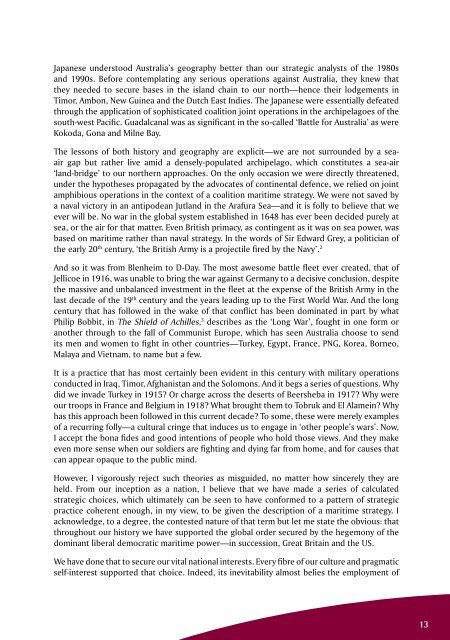190%202013%20Mar_Apr
190%202013%20Mar_Apr
190%202013%20Mar_Apr
You also want an ePaper? Increase the reach of your titles
YUMPU automatically turns print PDFs into web optimized ePapers that Google loves.
Japanese understood Australia’s geography better than our strategic analysts of the 1980s<br />
and 1990s. Before contemplating any serious operations against Australia, they knew that<br />
they needed to secure bases in the island chain to our north—hence their lodgements in<br />
Timor, Ambon, New Guinea and the Dutch East Indies. The Japanese were essentially defeated<br />
through the application of sophisticated coalition joint operations in the archipelagoes of the<br />
south-west Pacific. Guadalcanal was as significant in the so-called ‘Battle for Australia’ as were<br />
Kokoda, Gona and Milne Bay.<br />
The lessons of both history and geography are explicit—we are not surrounded by a seaair<br />
gap but rather live amid a densely-populated archipelago, which constitutes a sea-air<br />
‘land-bridge’ to our northern approaches. On the only occasion we were directly threatened,<br />
under the hypotheses propagated by the advocates of continental defence, we relied on joint<br />
amphibious operations in the context of a coalition maritime strategy. We were not saved by<br />
a naval victory in an antipodean Jutland in the Arafura Sea—and it is folly to believe that we<br />
ever will be. No war in the global system established in 1648 has ever been decided purely at<br />
sea, or the air for that matter. Even British primacy, as contingent as it was on sea power, was<br />
based on maritime rather than naval strategy. In the words of Sir Edward Grey, a politician of<br />
the early 20 th century, ‘the British Army is a projectile fired by the Navy’. 2<br />
And so it was from Blenheim to D-Day. The most awesome battle fleet ever created, that of<br />
Jellicoe in 1916, was unable to bring the war against Germany to a decisive conclusion, despite<br />
the massive and unbalanced investment in the fleet at the expense of the British Army in the<br />
last decade of the 19 th century and the years leading up to the First World War. And the long<br />
century that has followed in the wake of that conflict has been dominated in part by what<br />
Philip Bobbit, in The Shield of Achilles, 3 describes as the ‘Long War’, fought in one form or<br />
another through to the fall of Communist Europe, which has seen Australia choose to send<br />
its men and women to fight in other countries—Turkey, Egypt, France, PNG, Korea, Borneo,<br />
Malaya and Vietnam, to name but a few.<br />
It is a practice that has most certainly been evident in this century with military operations<br />
conducted in Iraq, Timor, Afghanistan and the Solomons. And it begs a series of questions. Why<br />
did we invade Turkey in 1915? Or charge across the deserts of Beersheba in 1917? Why were<br />
our troops in France and Belgium in 1918? What brought them to Tobruk and El Alamein? Why<br />
has this approach been followed in this current decade? To some, these were merely examples<br />
of a recurring folly—a cultural cringe that induces us to engage in ‘other people’s wars’. Now,<br />
I accept the bona fides and good intentions of people who hold those views. And they make<br />
even more sense when our soldiers are fighting and dying far from home, and for causes that<br />
can appear opaque to the public mind.<br />
However, I vigorously reject such theories as misguided, no matter how sincerely they are<br />
held. From our inception as a nation, I believe that we have made a series of calculated<br />
strategic choices, which ultimately can be seen to have conformed to a pattern of strategic<br />
practice coherent enough, in my view, to be given the description of a maritime strategy. I<br />
acknowledge, to a degree, the contested nature of that term but let me state the obvious: that<br />
throughout our history we have supported the global order secured by the hegemony of the<br />
dominant liberal democratic maritime power—in succession, Great Britain and the US.<br />
We have done that to secure our vital national interests. Every fibre of our culture and pragmatic<br />
self-interest supported that choice. Indeed, its inevitability almost belies the employment of<br />
13


